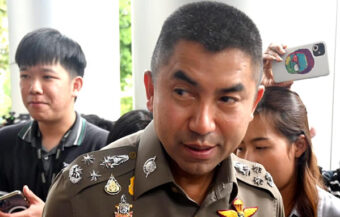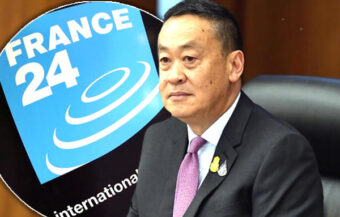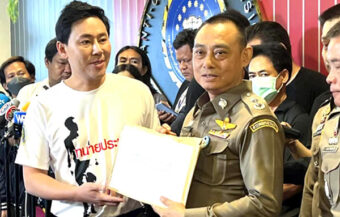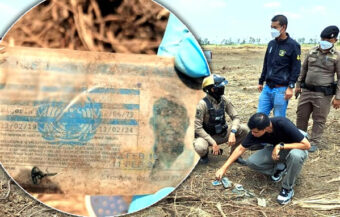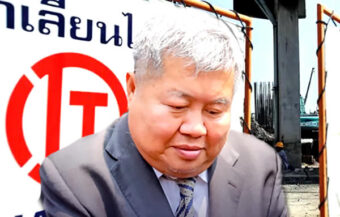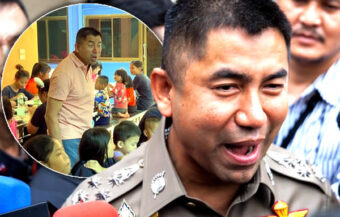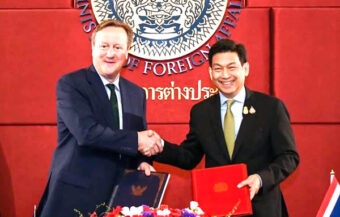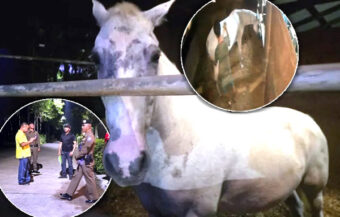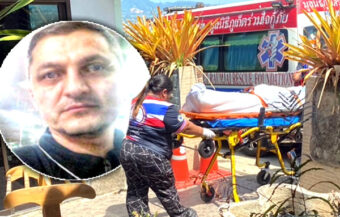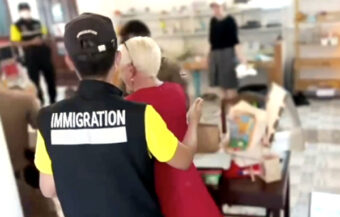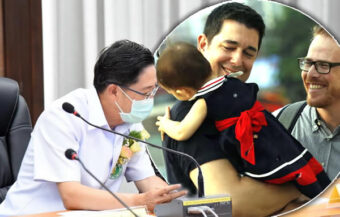BANGKOK: Thai Deputy Minister of Public Health Satit Pitutecha said on Saturday night that between 70 and 80 out of 200 returnees from South Korea had refused to comply with new quarantine registration and screening requirements on arrival. The Thai nationals are believed to have absconded after refusing to cooperate with officials who wished to detain them.
Reports on Saturday night suggested that between 70 to 80 out of 200 Thai returnees escaped the new quarantine regime that is being ramped up by all state agencies in the kingdom following the official announcement of six high-risk zone countries and territories on Thursday and quarantine provisions applying to them. Thai authorities are now empowered to forcibly place any passenger from the high-risk areas into quarantine but are trying to encourage self-quarantine where possible but subject to a daily report. This requirement is mandatory for all passengers. Thai police on Sunday said that they were adopting a dual approach with an enhanced regime for returning Thai migrants from high-risk countries such as South Korea while a regime of self-quarantine and reporting applied to all returning Thai passengers from trips and foreign arrivals. Top officials at the Ministry of Public Health have promised further information on the regulation requiring all arrivals from high-risk countries to self-report their health status to authorities daily.
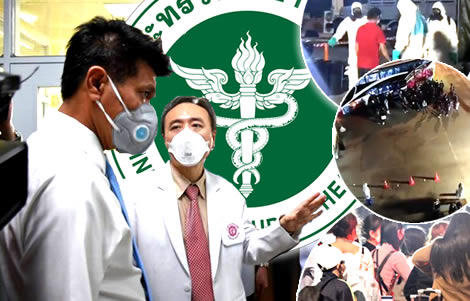
Thai authorities revealed on Saturday evening that between 70 and 80 passengers returning from South Korea had held out against orders to detain them for screening at a military base in Sattahip and had later absconded without complying with new quarantine regulations in place.
The details were confirmed by Thailand’s Deputy Public Health Minister, Satit Pitutecha. He revealed that authorities were now in the process of identifying and tracking down those involved. He said that the passengers would be punished under Thailand’s disease control legalisation now being deployed gradually by officials.
Deputy Health Minister: From Sunday all passengers from South Korea including foreigners will be transferred to Sattahip for screening
He explained that, from Sunday, all passengers arriving from South Korea would now be transferred to Sattahip for screening.
This would also apply to foreign travellers although he indicated that those found to be healthy would be transferred and allowed to self-quarantine at hotels.
All arrivals from the six high-risk zones are still required by authorities to self-quarantine and notify Thai authorities of their health status on a daily basis.
A fine of ฿20,000 may be applied to those who violated the new regulations which are already in force.
The high-risk countries and territories are China, Italy, Iran, South Korea, Hong Kong and Macau.
Government now has new powers to forcibly quarantine passengers from all high-risk countries
The government is now empowered to detain people and hold them in a quarantine control areas which are being established throughout the kingdom primarily, at this point, to deal with the growing number of arrivals from South Korea.
Italy a source of increased concern with 290,000 arrivals from high-risk countries in February
However, the situation regarding Italian visitors is causing increased concern with two Thai men, in their 40s, being announced on Saturday as the latest two cases of coronavirus infection in the kingdom. Both men are reported to have arrived back from Italy on an official trip.
The infections were announced on Saturday by Dr Sukhum Kanchanapimai, the permanent secretary of the Department of Public Health and spokesman, Taveesin Visanuyothin.
Thai officials are tracking down those who came into contact with the two men.
They are being treated at two separate hospitals, the Rajavithi Hospital and Nopparatrajathanee Hospital, after exhibiting symptoms in recent days and then being confirmed with the disease.
In February, 23,000 passengers arrived in Thailand from Italy compared to 58,000 from South Korea and 170,000 from China. In all, there were 290,000 passengers from the six countries or territories listed as high-risk zones by the government on Thursday.
Rising death toll with 16 million people locked down
The situation in Italy is developing quickly and the country is rapidly emerging as the most infected place in the world outside China.
The accelerating number of deaths in the country, where the disease has impacted its northern regions, has led to 16 million people being locked down as of Sunday with the death toll rising to 233.
An astonishing 1,247 cases were detected in the last 24 hour period.
Royal Thai Police announce heightened screening and quarantine regulations for high-risk countries
The Royal Thai Police has gone public on Sunday to emphasise the ramped up new screening procedures being applied by Thai authorities who also in Friday revealed that more people are being tested for the virus throughout the country with an average of between 300 and 400 per day.
On Sunday, senior police officers emphasised that China, South Korea, Italy and Iran were of particular interest to police in the heightened efforts to prevent a community-wide transmission of the virus in Thailand.
Police differentiating between Thai migrants and returning Thai passengers as well as foreigners
Colonel Choengron Rimpadee, the Deputy Commander of Immigration for Police Division 2, said that authorities would be cleaning and sterilising all inbound aircraft from these countries with particular attention to aircraft seating.
Officers will be focusing on Thai returnees found to have overstayed their visas in any foreign country.
The Thai police will be differentiating between Thai passengers returning from a foreign trip as well as foreigners and inbound Thai immigrants from high-risk countries.
It is understood that Thai returnees who have overstayed their visas in high-risk countries are being detained for screening but it is understood they will be later released and allowed to self-quarantine at home subject to daily monitoring by officials.
Powers allow Thai authorities discretion to make decisions based on individual circumstances
There appears to be a certain degree of latitude being allowed to authorities in the ground to decide what to do on a case by case basis.
Colonel Choengron said that airlines were cooperating with Thai authorities to prepare for the screening of all inbound passengers from high-risk countries.
Senior police officer urges all passengers including foreigners to self-quarantine and follow advice
Deputy police spokesman Police Colonel Krissana Pattanacharoen has urged all passengers from countries designated as high-risk, according to the new government regulation, to act responsibly and consider their social obligations by self quarantining for 14 days as required by the new orders.
He also suggested that they should wear a face mask to protect others.
The policeman said he believed that social pressure would encourage everyone to act according to official guidance.
Confusion in the media over the new high-risk zone regulations in relation to quarantine orders
Since the announcement of the new high-risk zones under the Communicable Diseases Act 2015 in the Royal Gazette on Thursday, there has been some confusion over the requirement that all passengers, including foreign arrivals, must self-quarantine for 14 days.
The new regulations allow Thai authorities to order the quarantine of people and passengers from those areas.
A spokesman on Thursday for the Ministry of Public Health confirmed that this was required in addition to daily reporting to authorities.
Top official says it is a ‘recommendation’ but if you don’t heed the advice then you may face legal action
On Friday, Sukhum Kanchanapimaim, the permanent secretary of the ministry put it more politely when he said that officials were ‘recommending’ self-quarantine but also added: ‘But if you don’t follow that, then we will use the law to take you to government quarantine centres.’
Also on Friday, some sources indicated that if required, authorities had the power to forcibly remove any person, whether foreigners or Thai, to a government-run ‘control zone’ to help fight the transmission of what the law has now classified as ‘dangerous disease’ under the 2015 legislation.
Thai authorities are responding to circumstances
The strength of the measures used by Thai authorities may, on a de facto basis, differ according to the severity of the situation as well as changing and individual circumstances.
Officials are dealing with a rapidly evolving situation, akin to a war, and are trying to find a balance between efficacy at protecting the Thai public and showing consideration to visitors.
The message to foreigners should be quite clear. If coming to Thailand, you are required to self-quarantine for 14 days and, in addition, to self-report daily to Thailand’s authorities.
Failure to do so will result in a fine and if a person is displaying symptoms of the virus, they may be tested or be forcibly quarantined at the discretion of authorities if found to have not self quarantined or followed official guidance.
Quarantine centres or control areas being readied if required by authorities throughout Thailand
Throughout Thailand, facilities such as the Bang Khunthian Geriatric Hospital in Bangkok and a sports arena in Chiang Mai are being prepared for use as quarantine centres.
At the same time, the government appears to be trying to find a solution where as many people as possible self-quarantine which has the dual advantage of conserving budgets, a consideration pointed out by the prime minister last week, and keeping facilities on standby in the event of a sudden deterioration in the situation.
First South Korea returnees, 59 people arrived at Sattahip naval base at 2 am on Sunday
The first test in the coming days will be the large numbers expected from South Korea. Estimates suggest that 5,000 to 10,00o Thai immigrants may be on the way, many of them illegal or ‘little ghosts’ as they are known in Thailand.
On Sunday, it was reported that 59 Thai returnees from South Korea were brought to the Royal Thai Naval base at Sattahip before 2 am.
They will be held in special facilities designed to hold men and women separately and a third area for families.
The bus that transferred the groups was guarded on arrival and then intensively scrubbed down in a 6-hour operation.
The world, including Thailand, is now at war with this virus and those who suggest otherwise had better get with the programme.
Further reading:
Quarantine for high-risk country passengers still pondered with 4 new cases from Italy and Iran
Strong indications that Thailand will introduce high-risk zones and mandatory quarantine orders



